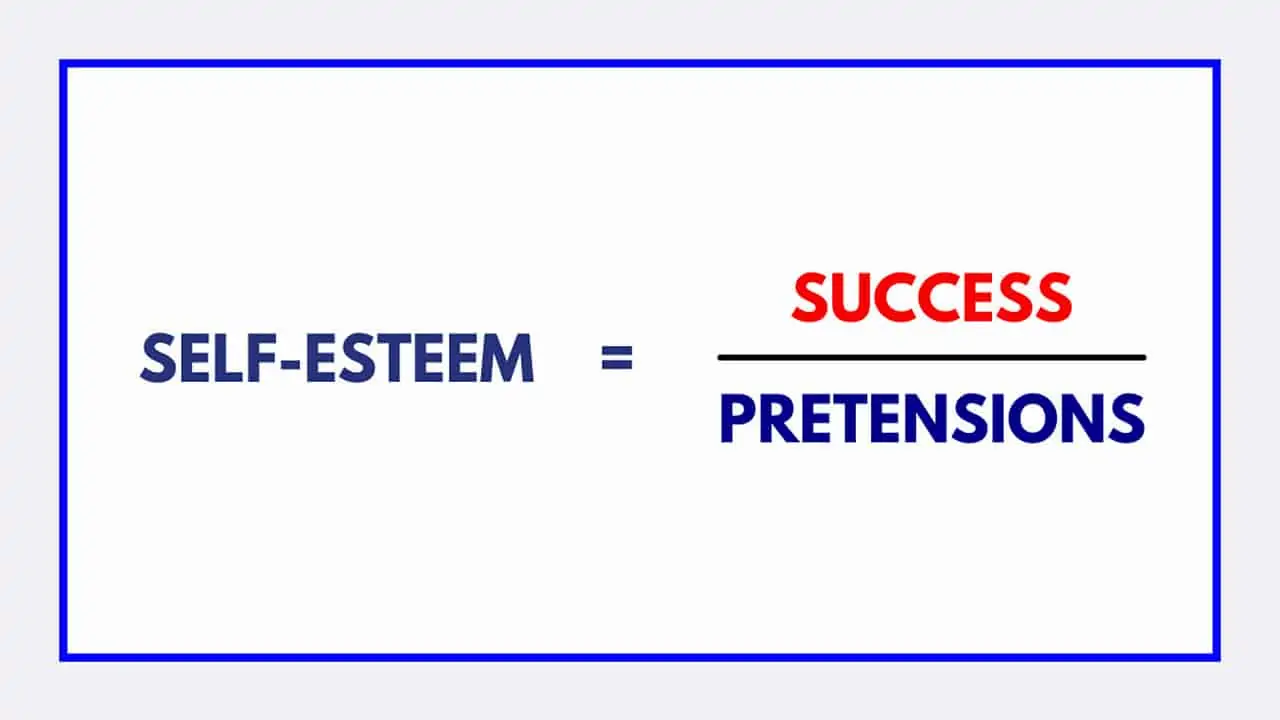Reading time: 9 minutes
Do you ever tell yourself, “That happened because I’m never any good?” How about this: “I always mess things up?” Do you consistently sell yourself short because you believe you are inferior to others?Did it occur to you that it could be low self-esteem causing this?
Low self-esteem is often the reason behind our sadness, anger, hostility, shame, guilt, cognitive dissonance, and loneliness. It also gets the blame for mental disorders like depression, anxiety, and learning difficulties.
Whereas, we usually associate high self-esteem with better health, success, happiness, and fulfillment. People with high self-esteem believe they have many more positive qualities than those who have poor self-esteem.
By the way, self-esteem is how people generally feel about themselves. It is your sense of your self-worth and the attitude that you have toward yourself.
Self-esteem is firmly a part of positive psychology now. Studies clearly show links between self-esteem and happiness, well-being, and optimal functioning (Diener & Diener, 1995; Baumgardner and Crothers, 2009; Carr, 2011).
History of Self-Esteem
Self-esteem is one of the oldest topics in psychology.
William James introduced the term in the first American textbook on psychology. James’ original definition of self-esteem saw it as a ratio between success and pretensions (James, 1890).

Alfred Alder viewed self-esteem as a way out of the inferiority complex (Adler, 1827). Abraham Maslow explored it from the humanistic side and connected it to self-actualization (Maslow, 1968).
Nathaniel Branden introduced self-esteem to popular culture through his bestseller, The Psychology of Self-Esteem (Branden, 1969). He said it is the “integrated sum of self-confidence and self-respect.”
According to Stanley Coopersmith, 1967, self-esteem has at least four dimensions: significance, competence, power, and virtue.
Morris Rosenberg developed a 10-item self-esteem survey in 1965, which became the “gold standard” in self-esteem research.
In 1996, Baumeister, Smart, and Boden criticized self-esteem and proposed a high level of it was linked to egotism, bullying, and narcissism. This dark side is true of defensive self-esteem.
Causes of Low Self-Esteem
Low self-esteem is strongly linked to depression and anxiety. In fact, low self-esteem is identified as a feature of at least 24 mental disorders in the Diagnostic and Statistical Manual of Mental Disorders, 4th edition, the year 2000.
People with low self-esteem judge themselves poorly and negatively. They may abandon their life goals and wallow in self-pity.
Often, the things that we learn in our childhood years — or later in the adolescent age — influence our thoughts, behavior, and actions. Childhood stress can cause low self-esteem in later years. Even as adults, if we stay under long periods of stress, we might form negative beliefs about ourselves.
Living in cruel relationships, as with narcissists or psychopaths, may also make us rack up some seriously low opinions about our self-worth.
Low self-esteem may be caused by a difficult childhood, negative social relations, poor performance, drug or alcohol abuse, stressful events and trauma, financial shortage, breakups, loss of trust after cheating by partner, and feelings of powerlessness and worthlessness.
Some common causes of low self-esteem:
- Stressful life events and experiences
- Negative thinking patterns and biased expectations
- Moody temperament
- Loneliness and social isolation
- Difficult childhood conditions, such as abuse or trauma
- Underlying mental health problems, such as depression
- Domination by oppressive people
Understanding Low Self-Esteem
Your self-esteem is literally how much value you put on yourself. It depends on two things: 1. Belonging, and 2. Mastery.
- Belonging is the feeling of being unconditionally loved and valued, not for any specific quality or cause, but simply for being who they are. A sense of belonging provides people with a secure foundation in life. It gives them the feeling that they are appreciated and respected regardless of what occurs to them.
- Mastery entails believing that we have an impact on the world, albeit not on a grand scale, but in our everyday life. We don’t have to believe we’re a talented guitarist or a top performer to create a sense of mastery. Mastery is the experience we get when we are completely immersed in an activity or working to solve a challenge.
We all have moments when we are self-critical and have negative thoughts about our abilities. This is not unusual. Even the most accomplished experts in their fields often view themselves critically.
However, if you castigate yourself regularly, it can become a low self-esteem issue. At that point, you start playing the role of your own worst enemy.
People who have low self-esteem often have a negative opinion of themselves. The real problem is, the more they appraise themselves in this way, the more likely they become to declare this identity to their social networks.
They repeat things like “I’m a loser” so frequently that it becomes clear to those around them that they want to be identified as a loser. Over time, this barrage of negative judgments becomes their deep-seated beliefs.
• Read the 25 Helpful Quotes To Raise Your Self-Esteem.
Test Your Self-Esteem
Ask yourself, and answer, this question in this single-item test to measure your self-esteem (infographic below):

Harmful Effects of Low Self-Esteem
Researchers have shown that high self-esteem is associated with superior physical health, better psychological wellbeing, and more optimism and happiness. While low self-esteem has been found to be related to anxiety, depression, and alcohol dependence.
Low self-esteem may cause the following detrimental effects:
- Stop seeing one’s own positive qualities
- Smoking and drinking habits become worse
- Partners and family find the person growing aloof
- Find it difficult to speak or stand up for themselves
- Often find themselves trying too hard to please others
- Distance themselves from enjoyable activities of all kinds
- Stop accepting all compliments from others about themselves
- Performance at work suffers, and so do relationships with colleagues
- Become overly self-conscious and tend to withdraw from all social connections
- Aggressive reactions in the face of even minor criticisms, called Hostile Attribution Style (HAS).

How To Overcome Low Self-Esteem
Here are some proven ways to raise your self-esteem:
- Challenging your negative self-beliefs
- Keeping a thought-diary and examining it
- Taking up small tasks needing little energy
- Starting with moderate-level physical activity
- Spending time with positive and joyful people
- Sleeping and eating well, and doing some fun-filled activities
- Building a regular habit of mindfulness meditation
How To Overcome Low Self-Esteem With Mindfulness
Psychologists have found practicing mindfulness can help one overcome their low self-esteem.
Mindfulness is a way of being aware of the present moment, with an attitude of openness, curiosity, and non-judgment. Being mindful is to observe your moment-to-moment experiences — your thoughts, feelings, and sensations. You let your thoughts and emotions arrive and pass through your mind, but do not react or get carried away by them.
It trains our mind to observe our feelings and thoughts just as they appear, without getting involved or passing judgments. In a way, it helps us live our lives more to the full, even if there are no self-esteem issues in our lives.
Researchers have found that mindfulness increases compassion, acceptance, positive emotions, and general wellbeing.
In 2013, Christopher Pepping, with his colleagues at Griffith University, Australia, did a study. It was a twin study, meaning two studies done within one. Pepping found that mindfulness training given to undergraduate psychology students increased their self-esteem.
The research team expected to find out if mindfulness would raise a student’s self-esteem levels. They believed the process underlying mindfulness would involve:
- holding attention to the present,
- putting labels on internal experiences,
- bringing non-judgment to emotions and behavior, and
- letting thoughts and emotions interact (but not react) with awareness.
In their first study, they found that those who had better mindfulness skills also had higher self-esteem. But it was a simple correlation — meaning that two separate conditions appear together, but do not explain which causes which. So they did another study.
And their second study turned out to be the real deal.
In the second study, they gave 15-minute mindfulness training to half of the thirty students. To the other half, they gave a 15-minute story about a carnivorous plant. Afterward, the participants received questionnaires.
They found those in the mindfulness group had higher self-esteem (and better mindfulness, of course). In the other group, there were no such changes. This led them to conclude that mindfulness increases self-esteem levels. But they weren’t sure if the effect was anything beyond temporary.
The Griffith University research team wrote:
Mindfulness may be a useful way to address the underlying processes associated with low self-esteem, without temporarily bolstering positive views of oneself by focusing on achievement or other transient factors. In brief, mindfulness may assist individuals to experience a more secure form of high self-esteem.
In Dec 2015, a review study of 17 studies was published in the journal Mindfulness by Chloe Randall and the team. They found that most of these studies reached the same conclusion:
Mindfulness training significantly raised self-esteem.
Back in 2007, Norman Farb and his team carried out a series of fMRI studies. They found that people who practiced mindfulness showed less activity in the brain region linked to self-evaluation and analysis (the medial prefrontal cortex). There was also an increase in activity in brain regions linked to moment-by-moment experiences (the lateral prefrontal cortex, especially the insula).
Final Words
The conclusion is straightforward: If you feel you are going through a phase of low self-esteem, gently welcome into your life the practice of mindfulness. Even 15 minutes a day is enough. If you sense one of your friends or loved ones is in the same state, advice them the same.
• • •
Free download: Beginner’s Guide to Learn Mindfulness In 7 Steps.
• • •
Author Bio: Written and reviewed by Sandip Roy—a medical doctor, psychology writer, and happiness researcher. Founder and Chief Editor of The Happiness Blog. Writes popular science articles on happiness, positive psychology, and related topics.
• Our story: Happiness Project
√ If you enjoyed this, please share it on Facebook or Twitter or LinkedIn.
